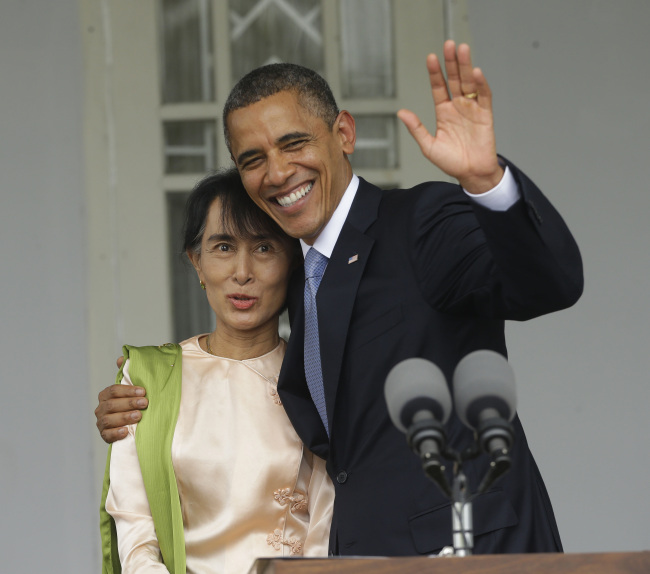U.S. President Barack Obama urged Myanmar Monday to step up its reform drive on a historic visit during which he was cheered by huge crowds and welcomed by Aung San Suu Kyi at the home where she was locked up for years.
The trip, the first to Myanmar by a serving U.S. president, came as the regime freed dozens more political prisoners to burnish its reform credentials.
 |
U.S. President Barack Obama (right) waves as he embraces Myanmar‘s opposition leader Aung San Suu Kyi after addressing members of the media at Suu Kyi’s residence in Yangon on Monday. (AP-Yonhap News) |
In once unthinkable scenes, Obama's motorcade passed tens of thousands of flag-waving supporters -- some chanting "America" -- lining the streets of Yangon, the backdrop for several bloody crackdowns on pro-democracy uprisings.
After a red-carpet welcome for Air Force One, Obama met Myanmar's reformist President Thein Sein, hoping to embolden the former general to speed up the country's march out of decades of iron-fisted military rule.
"This is just the first step on what will be a long journey," Obama told reporters as Thein Sein looked on.
Obama paid a brief visit to Shwedagon Pagoda, a gold-plated spire encrusted with diamonds and rubies that is the spiritual centre of Burmese Buddhism.
He later stood side-by-side with democracy icon Aung San Suu Kyi at the lakeside villa where his fellow Nobel laureate languished for years under house arrest, as the presidential limousine sat parked outside.
Huge crowds could be heard chanting "Obama, freedom" in the streets nearby.
Obama said the goal of his trip was "to sustain the momentum for democratisation".
"That includes building credible government institutions, establishing rule of law, ending ethnic conflicts and ensuring that the people of this country have access to greater education, health care and economic opportunity," he said.
Suu Kyi for her part sounded a note of caution about the sweeping changes.
"The most difficult time in any transition is when we think that success is in sight," she said. "We have to be very careful that we're not lured by the mirage of success."
The White House hopes Obama's visit to Myanmar will strengthen Thein Sein's reform drive, which saw Suu Kyi enter parliament after her rivals in the junta made way for a nominally civilian government.
The trip is seen as a political coup for Obama -- albeit one with risks -- and a major boost for Thein Sein, who has faced resistance from hardliners within his regime to the rapid political changes.
Obama has stressed his visit is not an "endorsement" of the regime but "an acknowledgement" of the reform process.
Some human rights groups said Obama should have waited longer to visit, arguing that he could have dangled the prospect of a trip as leverage to seek more progress such as the release of scores of remaining political prisoners.
Obama was set to use a major speech at Yangon University to urge the country not to extinguish "the flickers of progress".
"Today, I have come to keep my promise, and extend the hand of friendship,"
Obama will say, according to excerpts of his address. "But this remarkable journey has just begun, and has much further to go."
The setting for the speech will be rich in symbolism. The university was the scene of past episodes of pro-democratic student unrest, including mass demonstrations in 1988 that ended in a bloody military crackdown.
In a nod to a recent wave of deadly sectarian violence in western Rakhine state, Obama will urge Myanmar to "draw on diversity as a strength, not a weakness".
Two major outbreaks of violence since June between Muslims and Buddhists have left 180 people dead and more than 110,000 displaced, mostly stateless Rohingya Muslims who have faced decades of discrimination.
Myanmar unveiled a series of new pledges on human rights ahead of Obama's visit, vowing to review prisoner cases in line with "international standards" and open its jails to the Red Cross.
Activists said the regime also freed at least 44 political prisoners in an amnesty that coincided with his trip.
The West has begun rolling back sanctions in response to the sweeping changes and foreign firms including U.S. giants such as Pepsi and Coca-Cola are eager to return.
The United States on Friday scrapped a nearly decade-old ban on most imports from the country, after earlier lifting other sanctions. Officials said Obama would announce a $170 million development aid pledge during his visit. (AFP)





![[Exclusive] Hyundai Mobis eyes closer ties with BYD](http://res.heraldm.com/phpwas/restmb_idxmake.php?idx=644&simg=/content/image/2024/11/25/20241125050044_0.jpg)
![[Herald Review] 'Gangnam B-Side' combines social realism with masterful suspense, performance](http://res.heraldm.com/phpwas/restmb_idxmake.php?idx=644&simg=/content/image/2024/11/25/20241125050072_0.jpg)

